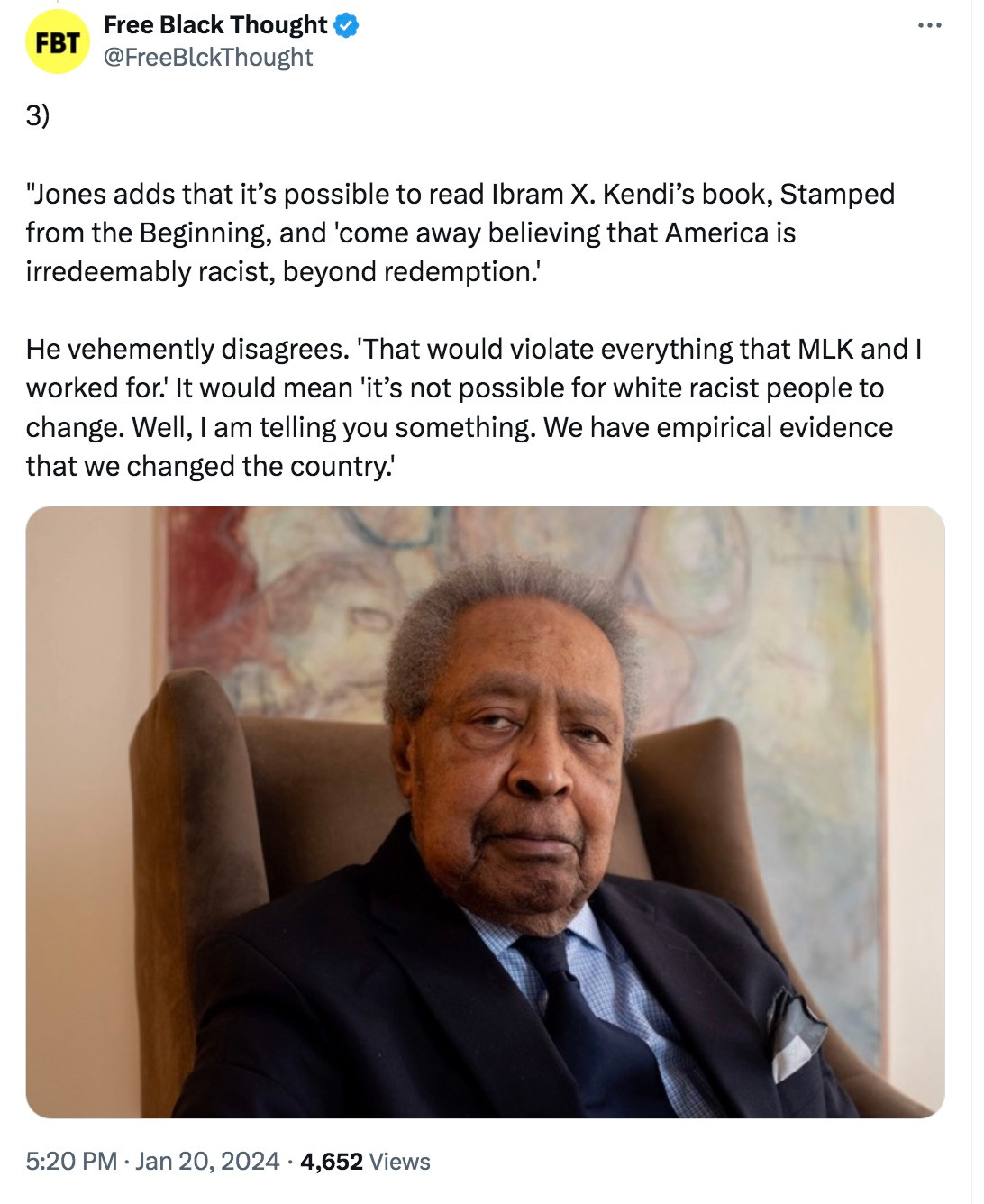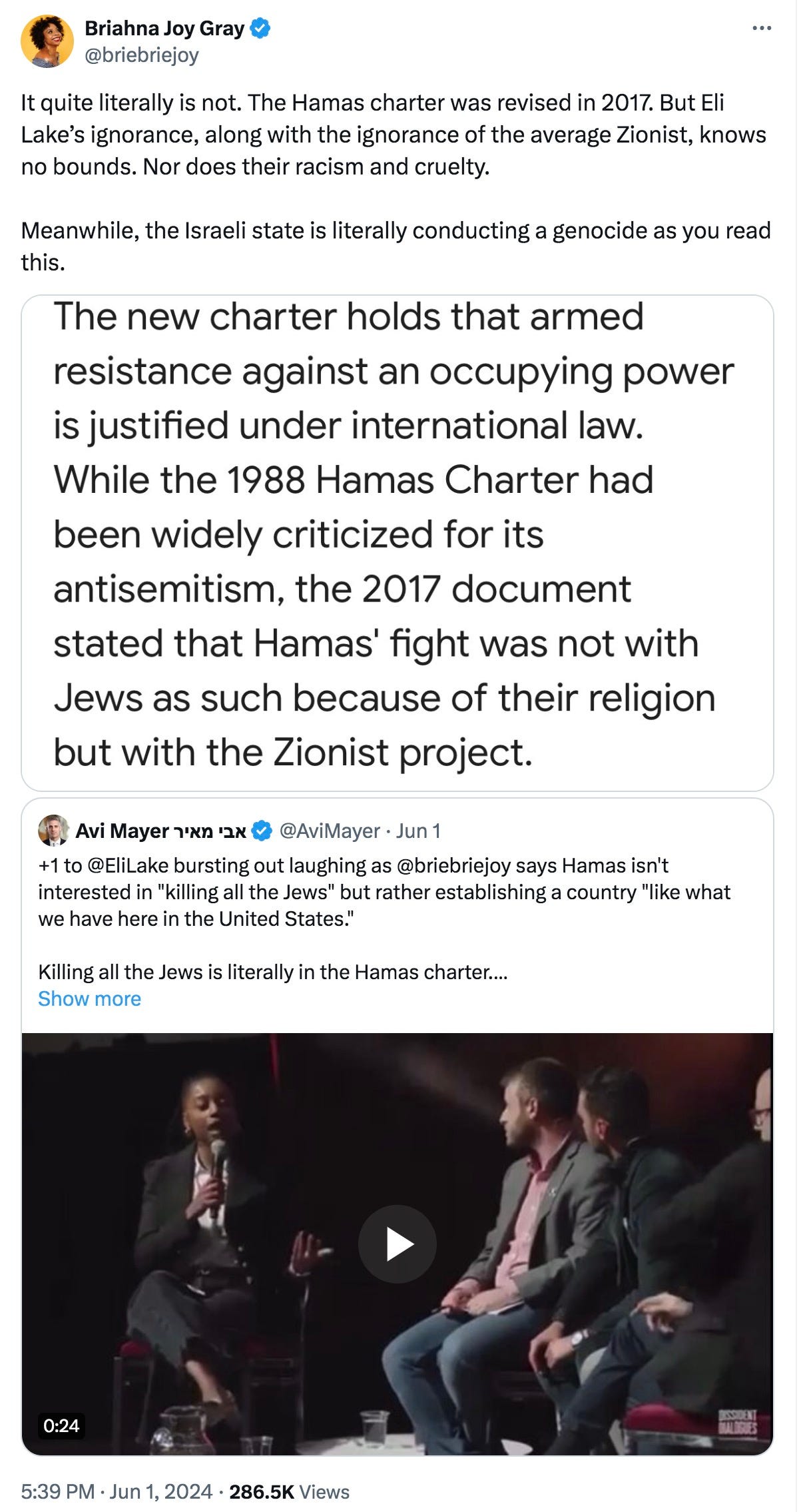E-Pluribus | June 3, 2024
Columbia University is looking for some good DEIers—er, researchers; on a related note, the decline American higher education; and the Supreme Court's NRA decision unites enemies.
A round-up of the latest and best musings on the rise of illiberalism in the public discourse:
John Sailer: Want to Get Hired by Columbia? Put DEI Before Teaching.
John Sailer has ferreted out more damning details on how Columbia University (of recent encampment fame) favors faculty applicants who celebrate DEI. Via The Free Press.
. . .Columbia is using an “evaluation tool”—strikingly similar to the Yale rubric—that mandates hiring committees assign more weight to DEI than teaching, and to give DEI equal weight to research.
The tool, designed by the Office of Equal Opportunity and Affirmative Action, tells faculty to give each candidate up to 50 points, with DEI comprising 15 of those points—the same amount as their research. An additional ten points each are awarded in the areas of teaching and service.
Within the DEI bracket, job candidates can score up to five points in each of the three categories[.]
[I]f Columbia search committees follow the advice of their administrators, they would rank an average researcher with strong DEI credentials more highly than an outstanding researcher who expresses skepticism about, say, segregated graduations.
Read it all.
Tunku Varadarajan: The Long View of Higher Ed’s Decline
At the Wall Street Journal, Tunku Varadarajan recently interviewed now-retired Harvard professor (and something of a campus unicorn — a conservative) Harvey Mansfield. Few people remain at the same institution for half a century as Mansfield did, and this uniquely positions him to give a birds-eye view of higher education’s trajectory over that time.
If you want the long view of what’s gone wrong with American higher education, you could do worse than talk with Harvey Mansfield. Mr. Mansfield is 92, and he taught at Harvard for well over half a century, retiring from the government department only last year. A scholar of Machiavelli and Tocqueville, he is a lifelong conservative. He says he leaves behind a department with only one professor “who isn’t a liberal or progressive.”
[. . .]
By 1969, when Mr. [Harvey] Mansfield was appointed as a full professor, political liberals were beginning to pack the department with their own kind. But “those were still liberals,” he says, “who were willing to appoint somebody like me, who was an opponent of what they believed.”
The American academy has turned hyperpartisan since those days. The left-liberal Boston Globe asked in a February headline: “Will Harvard ever get another professor like Harvey Mansfield?” The answer is almost certainly no. If Mr. Mansfield’s now-vacant university chair stays with the government department instead of being allocated to another faculty, it would be a near-miracle if Harvard were to appoint a conservative like him to the job he once held. Even liberals are outnumbered in the professoriate by those who style themselves progressives—no-holds-barred leftists for whom any ideological cohabitation is anathema.
How does Mr. Mansfield define the difference between a progressive and a liberal? A progressive has a “loathing for his country. It goes beyond embarrassment to real dislike of America, and in a way, therefore, of themselves, because after all they’re Americans.” Theirs is a kind of “fanatical penitentialism.” The liberal, by contrast, believes America is imperfect but remediable “or even worthy of pride—in the things, for example, that have been done contrary to white supremacy, as they see it.”
Driven by his own loathing of progressives, Mr. Mansfield harbors some sympathy with America’s liberals. He believes that any solution to the ideological mess in American universities will likely come from “dismayed liberals.” And whereas there has been a great deal of successful conservative pushback in recent times—he cites Students for Fair Admissions v. Harvard (2023), the Supreme Court decision against racial preferences in admissions, along with the growing resistance to “diversity, equity and inclusion”—he doesn’t believe that people of his persuasion are up to fighting the academic culture wars on their own.
“Conservatives believe in propriety,” he says. “We don’t demonstrate in the streets and occupy campuses. There are no conservative tantrums.” (For that reason, he says, “Donald Trump is not a conservative. Propriety is something he violates, or seeks to impress people by violating.”)
[. . .]
Alongside Mr. Mansfield’s unapologetic championing of the Western canon is a fierce fealty to the U.S. Constitution, which he regards as a bulwark against the nihilism that besets this country. In “America’s Constitutional Soul” (1991), he describes his countrymen as “a constitutional people,” and he insists that we are still that way “in practice, though our parties seem to differ over this.” The Republicans, he says, “are the party of the Constitution.” Since the Democrats “can’t reject the Constitution politically, they call it a living Constitution, which is a kind of rejection, but not in name. I call them the party of bathrooms and pronouns.” He complains that law schools “only teach the amendments. They don’t teach the actual structure of what makes the government work.”
Read it all here.
Billy Binion: The NRA's Unanimous Supreme Court Victory Is Good for Free Speech—No Matter How You Feel About Guns
Based on most reporting about the Supreme Court, many people would find a unanimous verdict quite surprising. But if you throw the NRA and the ACLU into the mix too, some might think they’re being pranked. Billy Binion at Reason says, however, that it’s really true and he explains why, in this case, it’s especially good news for free speech.
What do the National Rifle Association (NRA), the American Civil Liberties Union (ACLU), and nine U.S. Supreme Court justices from five presidential administrations all have in common? That list is likely relatively small. But at least one area of overlap was made evident Thursday when the Court published a unanimous ruling that a New York government official allegedly violated the First Amendment by pressuring insurers and banks to sever business ties with the NRA, which the ACLU is representing.
The decision resuscitates the gun advocacy group's lawsuit against Maria Vullo, the former head of New York's Department of Financial Services (DFS). The U.S. Court of Appeals for the 2nd Circuit had previously ruled in her favor.
[. . .]
The constitutional issue at stake here is similar to the one the Court explored in Murthy v. Missouri, the case that asks if President Joe Biden's administration violated the First Amendment when it sought to convince social media companies to remove content it disliked. During those oral arguments in March, many justices appeared sympathetic to the view that government officials had not overstepped the bounds of their authority and had merely exercised their own free speech rights to persuade those companies to adopt their views, not unlike a White House press secretary promoting an ideological slant to the media.
But in NRA v. Vullo, the Court ruled unanimously that Vullo's actions as alleged by the NRA had crossed the line from persuasion into coercion. "Government officials cannot attempt to coerce private parties in order to punish or suppress views that the government disfavors," wrote Justice Sonia Sotomayor. The NRA, she said, "plausibly alleges that respondent Maria Vullo did just that."
The decision sends the case back to the 2nd Circuit, which could still give Vullo qualified immunity, the legal doctrine that shields government officials from suits like the NRA's if the misconduct alleged has not been "clearly established" in prior case law. That outcome is certainly probable, as the 2nd Circuit's original decision not only ruled that Vullo had not violated the Constitution—which the Supreme Court rejected today—but that even if she had, qualified immunity would insulate her from the NRA's claim.
It is difficult to imagine, however, a more obvious violation of the Constitution than the weaponization of government power to cripple advocacy disfavored by the state. The supposed reason for qualified immunity is that taxpayer-funded civil servants deserve fair notice that conduct is unlawful before a victim can seek recourse for those misdeeds. To argue that a government agent could not be expected to understand the contours of the First Amendment here is rather dire.
Read the whole thing.
Around Twitter (X)
Via Free Black Thought, here’s Clarence B. Jones, lawyer and close friend of Martin Luther King Jr., on the subject of racial progress in America. Click for the whole thread.
Commenting on a long Aaron Sibarium thread detailing a UCLA medical school race-based program, here’s Colin Wright:
And finally, here’s Briahna Joy Gray explaining how, after 2017 at least, Hamas no longer explicitly calls for the “killing of all Jews” in its charter. What it’s really interested in is establishing a multi-ethnic society more like the United States. No, really.










